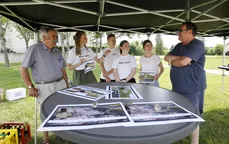Our courses

Through our theoretical and practical courses we want to enable students from different disciplines dealing with various ecosystem and landscape contexts to identify interactions between goals of biodiversity protection, climate adaptation, agricultural production and human well-being. We aim to provide students the theoretical and practical tools to promote potential synergies and thus to examine and design sustainable, multifunctional landscapes. We use teaching methods such as ‘traditional’ lectures, flipped classrooms and experientail larning, and research-focused project work. In doing so, we emphasize an integrated view of ecological and social dimensions of ecosystems and landscapes, with a strong focus on urban and agricultural systems.
Summer semester
| Course | Lecturers | SWH |
|---|---|---|
| Advanced Concepts and Methods in Urban Ecosystems (SE) | Prof. Dr. Monika Egerer, Prof. Dr. Stephan Pauleit, Dr. Mohammad Rahman | 2 |
| Advanced Concepts and Methods in Urban Ecosystems (UE) | Prof. Dr. Monika Egerer, Prof. Dr. Stephan Pauleit, Dr. Mohammad Rahman | 3 |
| CampusAckerdemie - Garden Educator Training (SE) | Theresia Endriß | 5 |
| Exam colloquium (KO) | Prof. Dr. Monika Egerer | 2 |
| History of Landscape Architecture (UE) | Prof. Dr. Udo Weilacher, Prof. Dipl.-Ing. Regine Keller, Prof. Dr.-Ing. Ferdinand Ludwig, Prof. Dr. Monika Egerer, Prof.Dr.-Ing. Schöbel-Rutschmann | 1 |
| Project Landscape Planning 3 "Ecological concepts" (PT) | Prof. Dr. Wolfgang Weißer, Prof. Dr. Monika Egerer, Dr. Brandon Mak, Dr. Joan Casanelles-Abella | 6 |
| Ecology and ecosystem functions of insects in agricultural landscapes | Prof. Dr. Sara Leonhardt, Prof. Dr. Monika Egerer, Prof. Dr. Livia Cabernard, Astrid Neumann, Susanne Werle | 3 |
| Monitoring and control of insects and their functions | Prof. Dr. Sara Leonhardt, Prof. Dr. Monika Egerer, Astrid Neumann, Susanne Werle | 2 |
Winter semester
| Course | Lecturers | SWH |
|---|---|---|
| Urban Agriculture (VO) | Prof. Dr. Monika Egerer | 2 |
| Edible Cities (UE) | Prof. Dr. Monika Egerer | 2 |
| Urban Productive Ecosystems (VO, SE) | Prof. Dr. Monika Egerer | 3 |
| Seminar Applied Ecology and Planning (SE) | Prof. Dr. Johannes Kollmann, Prof. Dr. Monika Egerer, Prof. Dr. Jürgen Geist, Prof. Dr. Ingrid Kögel-Knabner, Prof. Dr. Annette Menzel, Prof. Dr.-Ing. Stephan Pauleit, Prof. Dr. Anja Rammig, Prof. Dr. Rupert Seidl, Prof. Dr. Hanno Schäfer, Prof. Dr. Michael Schloter, Prof. Dr. Wolfgang Weißer, Apl. Prof. Dr. Thorsten Grams | 2 |
| Places of Change – Education for Sustainable Development Outside the Classroom (PT) | Theresia Endriß | 3 |
| Healthy and Sustainable Urban Development (virtual, VI) | Prof. Dr. Monika Egerer | 3 |
| Exam colloquium (KO) | Prof. Dr. Monika Egerer | 2 |